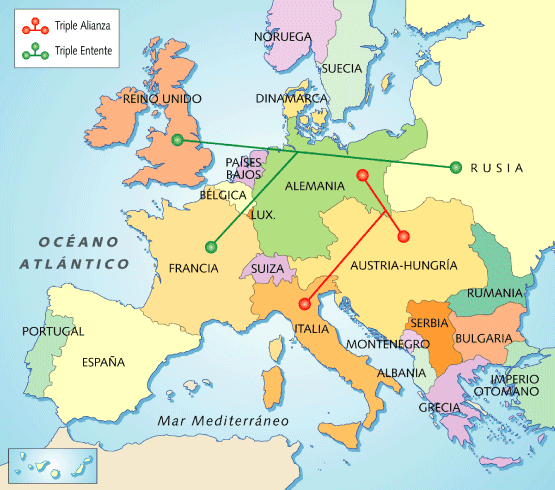This tension exploted when Franz Ferdinand (Austro-Hungarian prince) was killed in Sarajevo(Serbia). Austria declared war on Serbia on 28 July 1914, Russia made a treaty with Serbia and they allied with them to fight agains Austro-hungary empire. Germany, was an ally of Austria so their duty was to help Austria so they also declared the war on Russia. France bound by treaty to Russia, found itself at war against Germany.
Germany tried to make a great plan called "Schilieffen plan", it consisted on defeating France in the less time possible with 90% of Germans army and take advantage of the large territory of Russia, because they would need around 4 or 5 weeks to organise all warmy and attack, so Germans before attacked France and then moved to the East and attack Russia. This plan failed.
German tried another plan that was crossing Belgium (in that age, it was a neutral country). So Britain declared war on Germany because they were obligated to defend neutral Belgium.
On 1917 All countries were lack of food, army and economical resources to pay food or weapons. Then United States declared war on Germany because Germans seriously threatened America's commercial shipping. Russia left the war because of their revolution lack of food, water, countrie conditions, etc.
Finally the tripe alliance (Germany, Austro-Hungary and
Note: Italy was in the side of the triple alliance but then in 1915 changed partie and unificated its power with the other alliance.

Image from webpage:
http://guerramundial-primera.blogspot.com.es/2011/01/mapas-de-informacion-de-la-primera.html
Information from:
http://www.firstworldwar.com/origins/causes.htm
http://www.firstworldwar.com/bio/ferdinand.htm
http://www.spartacus.schoolnet.co.uk/FWWschlieffenP.htm
http://depts.washington.edu/baltic/papers/russianrevolution.htm

No hay comentarios:
Publicar un comentario